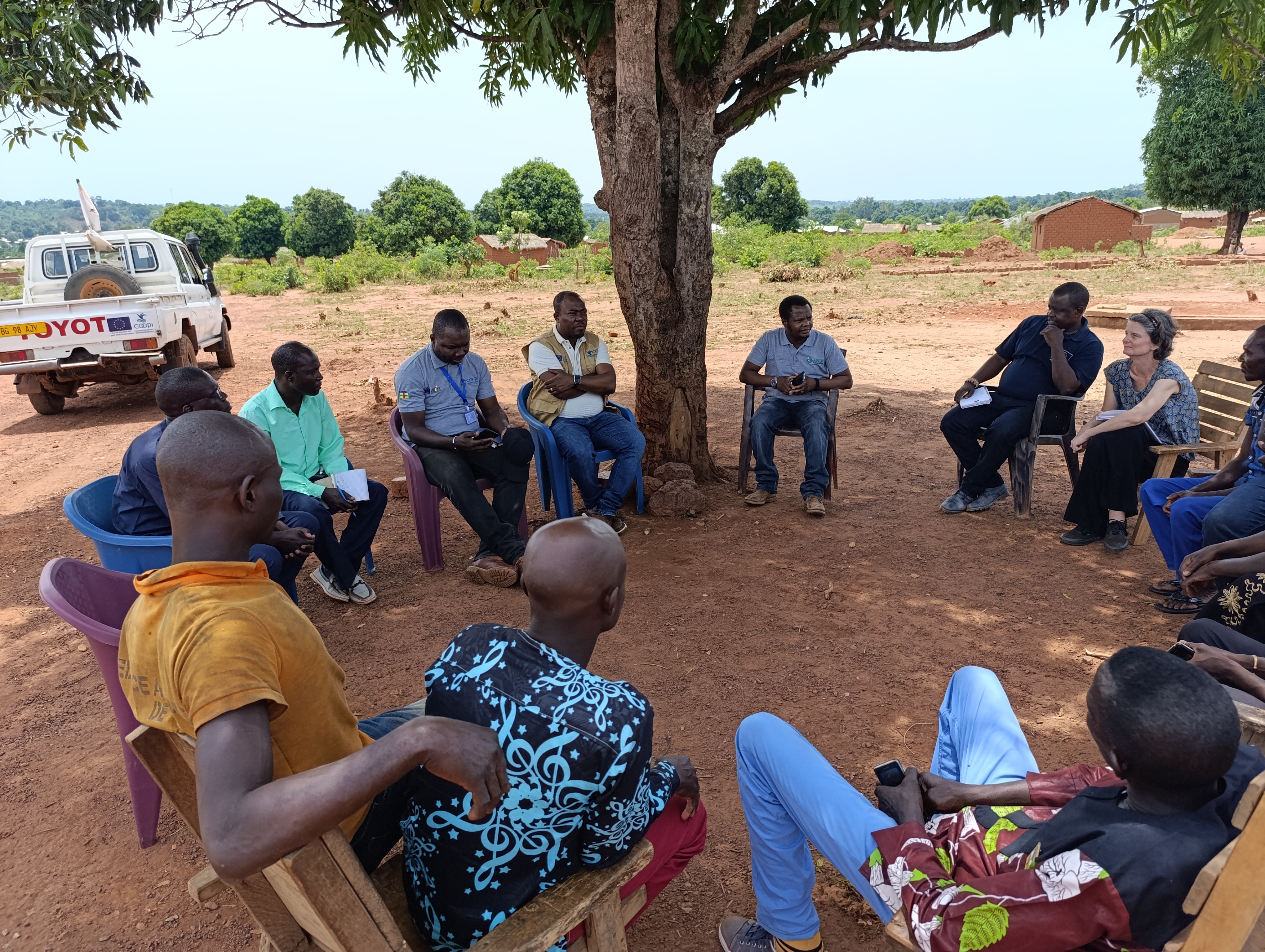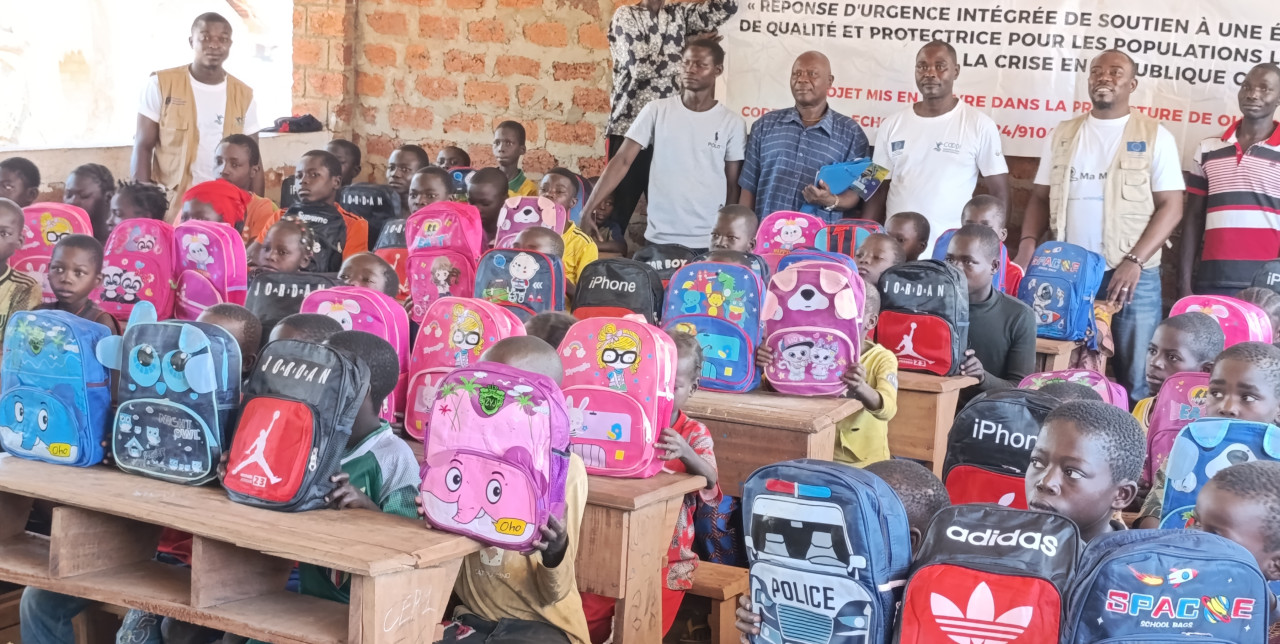10-07-2025 | di COOPI
CAR. ECHO visit aims to support education for children in conflict zones
From April 23 to 26, 2025, an education specialist from ECHO’s Dakar office, along with the program assistant based in the Central African Republic (CAR), carried out a field visit to the Ouham-Pendé region to assess educational programs aimed at children affected by conflict. The visit was part of the project "Integrated emergency response to support accessible, inclusive, quality and protective education for the most vulnerable populations affected by the crisis in the Central African Republic", funded by the European Union’s Humanitarian Aid branch (DG ECHO) and implemented by COOPI – Cooperazione Internazionale. Focusing on displaced children and youth in Obo, Zémio, Mboki, and Bozoum, the initiative provides an emergency education response tailored to the realities of crisis-affected communities, particularly targeting those who have dropped out of school or never had the chance to attend. The mission aimed to evaluate the real-world impact of aid in a context marked by ongoing insecurity, through direct meetings with local authorities, teachers, and students involved in the Accelerated Learning Program (PEA).
Progress and new priorities for education in Ouham-Pendé
The mission officially began on April 24 with meetings involving local authorities. Discussions centered on the security situation in the prefecture, a pressing concern amid a recent surge in violence. The delegation then visited several schools participating in the project, where conversations with teachers and students in the PEA offered valuable insight into the program’s day-to-day implementation and challenges within such a complex setting.

On April 25, the mission continued with additional site visits. Among the stops was Pont Ouham School, followed by a meeting at the academic inspectorate. Attention also turned to beneficiary families, focusing on Income-Generating Activities, a vital support mechanism that helps keep children in school by easing financial pressure on households. Discussions also explored the use of explicit instruction methods in the classroom, as well as WASH (Water, Sanitation and Hygiene) activities, which are key to maintaining safe and functional learning environments. Later in the day, the project manager presented a detailed update on key performance indicators, highlighting achievements and identifying critical challenges. Logistical and security constraints were flagged as major operational hurdles.
One of the clearest takeaways from the mission was the urgent need to integrate mine risk education into school curricula. This issue is particularly acute along the Bozoum–Bocaranga corridor, where several unexploded ordnance incidents have been reported. Raising awareness among children about these hazards is considered crucial to ensuring their safety.
Thanks to targeted and timely interventions, the Ouham-Pendé prefecture is laying the foundation for a resilient, inclusive, and protective education system that addresses the needs of its most vulnerable communities. ECHO’s visit to Bozoum underscored the importance of these efforts and reaffirmed that only through sustained, collective commitment can a brighter future be secured for children affected by the crisis.
Integrated education efforts in crisis settings
Since February 2025, Ouham-Pendé prefecture has faced an unprecedented surge in violence, driven by clashes between armed pastoralist groups, elements of the 3R rebel faction, and local self-defense militias. The situation has deteriorated rapidly along the Bozoum–Bouar and Bozoum–Bocaranga corridors, resulting in serious violations against civilians.
In response to this emergency, a rapid assessment revealed a severe disruption in education for nearly 950 students, a lack of resources for 30 displaced teachers, and overcrowding in the few functioning schools — a crisis reported already in a previous article. To address these challenges, COOPI activated an emergency response mechanism and, recognizing the need for a more structured approach, launched the PEA. This emergency education initiative is specifically designed for displaced children and adolescents who have had their studies interrupted, offering a flexible path to regain basic skills and support their reintegration into the formal education system. Currently, the PEA is serving 256 children across three displacement sites in Bozoum, providing not only learning opportunities but also a safe and protective space. In parallel, COOPI has distributed school and teaching kits to 895 students and 16 teachers across four displacement sites, ensuring access to essential materials and helping foster a safe, inclusive learning environment where children can begin to rebuild their futures.
Over 50 years of COOPI in CAR from emergency relief to long-term development
COOPI has maintained a continuous presence in the Central African Republic since 1974, working across both emergency and development sectors. Its focus has primarily been on child protection, emergency education, and food security. Since May 2024, the project "Integrated emergency response to support accessible, inclusive, quality and protective education” has aimed to prevent and mitigate disruptions to formal education for school-aged children. The initiative adopts a holistic approach that not only promotes access to learning but also seeks to improve health conditions for children and their communities, reinforcing the connection between education, protection, and overall well-being.




 Central African Republic
Central African Republic